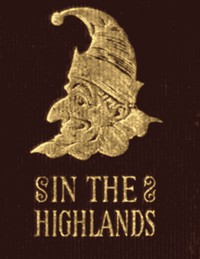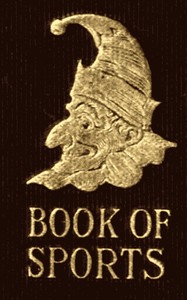Mr. Punch in the Highlands, J. A. Hammerton and Charles Keene [books to read romance .txt] 📗

Book online «Mr. Punch in the Highlands, J. A. Hammerton and Charles Keene [books to read romance .txt] 📗». Author J. A. Hammerton and Charles Keene
 GENEROSITY
GENEROSITY
Noble Lord (whose rifle has brought to a scarcely untimely end a very consumptive-looking fallow deer). "Tut—t, t, t, t, tut! O, I say, Stubbs!"—(to his keeper)—"you shouldn't have let me kill such a poor, little, sickly, scraggy thing as this, you know! It positively isn't fit for human food! Ah! look here, now! I'll tell you what. You and McFarlin may have this buck between you!!!"
[Pg 141]
 TRAVELLER TOO BON� FIDE
TRAVELLER TOO BON� FIDE
Dusty Pedestrian. "I should like a glass of beer, missis, please——"
Landlady. "Hae ye been trevellin' by rell?"
Pedestrian. "No, I've been walking—fourteen miles."
Landlady. "Na, na, nae drink will ony yin get here, wha's been pleesure-seekin' o' the Sawbath day!!"
[Pg 143]
 MR. PUNCH IN THE HIGHLANDS
MR. PUNCH IN THE HIGHLANDS
He goes on board the Iona. The only drawback to his perfect enjoyment is the jealousy caused among all the gentlemen by the ladies clustering round him on all occasions.
[Pg 145]
 PREHISTORIC PEEPS
PREHISTORIC PEEPS
There were often unforeseen circumstances which gave to the Highland stalking of those days an added zest!
[Pg 146]
THE PLEASURES OF TRAVEL (By Ane that has kent them)
'Tis a great thing, the Traivel;
I'll thank ye tae find
Its equal for openin' the poors o' the mind.
It mak's a man polished, an' gies him, ye ken,
Sic a graun' cosmypollitan knowledge o' men!
I ne'er was a stay-at-hame callant ava,
I aye must be rantin' an' roamin' awa',
An' far hae I wandered, an' muckle hae seen
O' the ways o' the warl' wi' ma vara ain een.
I've been tae Kingskettle wi' Wullie an' Jeames,
I've veesited Anster an' Elie an' Wemyss,
I've walked tae Kirkca'dy an' Cupar an' Crail,
An' I aince was awa' tae Dundee wi' the rail.
Losh me, sir! The wonnerfu' things that I saw!
The kirks wi' their steeples, sae bonny an' braw
An' publics whauriver ye turned wi' yer ee—
'Tis jist a complete eddication, Dundee!
Theer's streets—be the hunner! An' shops be the score!
Theer's bakers an' grocers an' fleshers galore!
An' milliners' winders a' flauntin' awa'
Wi' the last o' the fashions frae Lunnon an' a'.[Pg 148]
An' eh, sic a thrang, sir! I saw in a minnit
Mair folk than the toun o' Kinghorn will hae in it.
I wadna hae thocht that the hail o' creation
Could boast at ae time sic a vast population!
Ma word, sir! It gars ye clap haun' tae yer broo
An' wunner what's Providence after the noo
That he lets sic a swarm o' they cratur's be born
Wham naebody kens aboot here in Kinghorn.
What?—Leeberal minded?—Ye canna but be
When ye've had sic a graun' eddication as me.
For oh, theer is naethin' like traivel, ye ken,
For growin' acquent wi' the natur' o' men.
"Falls of Foyers."—A correspondent writes:—"I have seen a good many letters in the Times, headed 'The Falls of the Foyers.' Here and abroad I have seen many Foyers, and only fell down once. This was at the Th��tre Francais, where the Foyer is kept highly polished, or used to be so. If the Foyers are carpeted or matted, there need be no 'Falls.'"
Yours,
Common Sense."
[Pg 147]
 "WINGED"
"WINGED"
First Gael. "What's the matter, Tonal?"
Second ditto (who had been out with Old Briggs). "Matter! Hur legs is full o' shoots".
[Pg 149]
 MR. PUNCH AT THE HIGHLAND GAMES
Shows the natives how to "put the stone."
MR. PUNCH AT THE HIGHLAND GAMES
Shows the natives how to "put the stone."
[Pg 150]
 AN ARTIST SCAMP IN THE HIGHLANDS
AN ARTIST SCAMP IN THE HIGHLANDS
Artist (entering). "My good woman, if you'll allow me, I'll just paint that bedstead of yours."
Cottager (with bob-curtsey). "Thank ye, sir, I' sure it's very kind of ye—but dinna ye think that little one over yonder wants it more?"
EN �COSSE � Monsieur PunchDear Mister,—I come of to make a little voyage in Scotland. Ah, the beautiful country of Sir Scott, Sir Wallace, and Sir Burns! I am gone to render visit to one of my english friends, a[Pg 152] charming boy—un charmant gar�on—and his wife, a lady very instructed and very spiritual, and their childs. I adore them, the dear little english childs, who have the cheeks like some roses, and the hairs like some flax, as one says in your country, all buckled—boucl�s, how say you?
I go by the train of night—in french one says "le sleeping"—to Edimbourg, and then to Calendar, where I attend to find a coach—in french one says "un mail" or "un fourinhand." Nom d'une pipe, it is one of those ridicule carriages, called in french "un breack" and in english a char-�-banc—that which the english pronounce "tcherribaingue"—which attends us at the going out of the station! Eh well, in voyage one must habituate himself to all! But a such carriage discovered—d�couverte—seems to me well unuseful in a country where he falls of rain without cease.
Before to start I demand of all the world some renseignements on the scottish climate, and all the world responds me, "All-days of the rain." By consequence I procure myself some impermeable vestments, one mackintosch coat, one mackintosch cape of Inverness, one mackintosch covering of voyage, one south-western hat, some umbrellas, some gaiters, and many pairs of boots very thick—not boots of town, but veritable "shootings."
I arrive at Edimbourg by a morning of the most sads; the sky grey, the earth wet, the air humid. Therefore I propose to myself to search at Calender a place at the interior, et voil�—and see there—the breack has no interior! There is but that which one calls a "boot", and me, Auguste, can I to lie myself there at the middle of the baggages? Ah no! Thus I am forced to endorse—endosser—my impermeable vestments and to protect myself the[Pg 158] head by my south-western hat. Then, holding firmly the most strong of my umbrellas, I say to the coacher, "He goes to fall of the rain, is it not?" He makes a sign of head of not to comprehend. Ah, for sure, he is scottish! I indicate the sky and my umbrella, and I say "Rain?" and then he comprehends. "Eh huile", he responds to me, "ah canna s�, m�bi huile no h� meukl the d�." I write this phonetically, for I comprehend not the scottish language. What droll of conversation! Him comprehends not the english; me I comprehend not the scottish.
But I essay of new, "How many has he of it from here to the lake?" C'est inutile—it is unuseful. I say, "Distance?" He comprehends. "M�bi oui taque toua hours", says he; "beutt yile no fache yoursel, its no s� lang that yile bi ouishinn yoursel aoua." Quelle langue—what language, even to write phonetically! I comprehend one sole word, "hours." Some hours! Sapristi! I say, "Hours?" He says "Toua" all together, a monosyllable. Sans aucune doute �a veut dire "twelve"—douze. Twelve hours on a breack in a such climate! Ah, no! C'est trop fort—it is[Pg 160] too strong! "Hold", I cry myself, "attend, I descend, I go not!" It is true that I see not how I can to descend, for I am entour�—how say you? of voyagers. We are five on a bench, of the most narrows, and me I am at the middle. And the bench before us is also complete, and we touch him of the knees. And my neighbours carry on the knees all sorts of packets, umbrellas, canes, sacks of voyage, &c. Il n'y a pas moyen—he has not there mean. And the coacher says me "Na, na, monne, yile no ghitt doun, yile djest ba�d ouar yer sittinn." Then he mounts to his place, and we part immediately. Il va tomber de la pluie! Douze heures! Mon Dieu, quel voyage!
Agree, &c.,
Auguste.
[Pg 151]
 ZEAL
ZEAL
Saxon Tourist. "Been at the kirk?"
Celt. "Aye."
Saxon T. "How far is it?"
Celt. "Daur say it'll be fourteen mile."
Saxon T. "Fourteen miles!!"
Celt. "Aye, aw'm awfu' fond o' the preachin'"
[Pg 153]
 THRIFT
THRIFT
Peebles Body (to townsman who was supposed to be in London on a visit). "E—eh Mac! ye're sune hame again!"
Mac. "E—eh, it's just a ruinous place, that! Mun, a had na' been the-erre abune twa hoours when—bang—went saxpence!!!"
[Pg 154]
 A SATISFACTORY SOLUTION
A SATISFACTORY SOLUTION
"I fear, Duncan, that friend of mine does not seem overly safe with his gun."
"No, sir. But I'm thinkin' it'll be all right if you wass to go wan side o' him and Mr. John the ither. He canna shoot baith o' ye!"
[Pg 155]
 "VITA FUMUS"
"VITA FUMUS"
Tonal. "Whar'll ye hae been till, Tugal?"
Tugal. "At ta McTavishes' funeral——"
Tonal. "An' is ta Tavish deed?"
Tugal. "Deed is he!!"
Tonal. "Losh, mon! Fowk are aye deein' noo that never used to dee afore!!"
[Pg 156]
 PRECAUTIONS
PRECAUTIONS
Saxon Angler (to his keeper). "You seem in a great hurry with your clip! I haven't seen a sign of a fish yet—not a rise!"
Duncan. "'Deed, sir, I wisna a botherin' mysel' aboot the fush; but seein' you wis new to the business, I had a thocht it widna be lang afore you were needin' a left oot o' the watter yoursel'!"
[Pg 157]
 HIS POUND OF FLESH
HIS POUND OF FLESH
Financier (tenant of our forest, after a week's unsuccessful stalking). "Now, look here, my man. I bought and paid for ten stags. If the brutes can't be shot, you'll have to trap them! I've promised the venison, and I mean to have it!"
[Pg 159]
 SCRUPULOUS
SCRUPULOUS
Shepherd. "O, Jims, mun! Can ye no gie a whustle on tha ram'lin' brute o' mine? I daurna mysel'; it's just fast-day in oor parish!!"
[Pg 161]
 "THE LAND OF LORN"
"THE LAND OF LORN"
It has drizzled incessantly, for a fortnight, since the Smiths came down to their charming villa at Braebogie, in Argyleshire.
Keeper (who has come up to say the boat is ready on the loch, if "they're for fushin' the day"). "Eh! I should na wonder if this weather tur-rns ta rain!!"
[Pg 162]
 LOCAL
Sunday Morning
LOCAL
Sunday Morning
Tourist (staying at the Glenmulctem Hotel—dubiously). "Can I—ah—have a boat?"
Boatman. "Oo—aye!"
Tourist. "But I thought you—ah—never broke the—aw—Sabbath in Scotland?"
Boatman. "Aweel, ye ken the Sawbath disna' come doon to the loch—it just staps at the hottle!"
EN �COSSE (ENCORE) � Monsieur PunchDear Mister,—I have spoken you of my departure from Calendar on the breack. Eh, well, he rained not of the whole of the whole—du tout[Pg 164] du tout! Il faisait un temps superbe—he was making a superb time, the route was well agreeable, and the voyage lasted but two hours, and not twelve. What droll of idea! In Scottish twa is two, not twelve. I was so content to arrive so quick, and without to be wetted that I gave the coacher a good to-drink—un bon pourboire—though before to start all the voyagers had paid him a "tipp", that which he called a "driver's fee." Again what droll of idea! To give the to-drink before to start, and each one the same—six pennys.
My friend encountered me and conducted me to his house, where I have passed fifteen days, a sojourn of the most agreeables. And all the time almost not one sole drop of rain! J'avais beau—I had fine—to buy all my impermeable vestments, I carry them never. One sole umbrella suffices me, and I open him but two times. And yet one says that the Scotland is a rainy country. It is perhaps a season tout � fait—all to fact—exceptional. But fifteen days almost without rain! One would believe himself at the border of the Mediterranean, absolutely at the South. And I have eaten of the "porridg", me Auguste!





Comments (0)